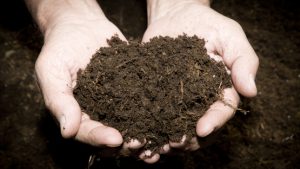 If you want your grass to grow greener, your trees to grow taller, or have a bumper crop of vegetables, then you might want to know as much as you can about soil. Florida soils are often sandy and nutrient-poor which require knowledge, patience, and effort to bring them into good condition. Soil problems can originate from a number of things such as erosion, lack of nutrients, unsuitable pH, too much or too little water, soil microbes, etc. Most of these problems can be fixed with proper soil management.
If you want your grass to grow greener, your trees to grow taller, or have a bumper crop of vegetables, then you might want to know as much as you can about soil. Florida soils are often sandy and nutrient-poor which require knowledge, patience, and effort to bring them into good condition. Soil problems can originate from a number of things such as erosion, lack of nutrients, unsuitable pH, too much or too little water, soil microbes, etc. Most of these problems can be fixed with proper soil management.
Poor soil management can lead to significant degradation not only of the environment, but also the quality of soil we want to work with. At any point where the soil surface is disrupted or is devoid of plant growth, this creates an opportunity for soil erosion to occur. The loss of topsoil removes critical nutrients and organic matter, affects the soil pH, disrupts soil microbes, and pollutes the rivers and streams with run-off. Erosion can largely be prevented by allowing bare soils to become locked in place with the help of vegetation above ground and the roots underground. Cover crops are an excellent choice to decrease or prevent further soil degradation.
If you need a pickaxe or a jackhammer to dig into soil it’s probably just as difficult for plant roots to grow through it as well. Soil compaction is something that can happen as a result of heavy objects, such as trucks, tractors, people, or cows, repeatedly compressing the soil. Compacted soils can stunt, weaken, or kill trees and entirely prevent other plants from being able to take root. This can often be remedied by using a soil aerator or plowing the compacted soil.
Nutrient depleted soils in Florida are a serious problem and largely originate from the combination of natural processes, intensive agricultural demands as well as erosion. The lack of key nutrients, such as nitrogen and potassium, and low (acidic) pH can make growing crops quite difficult. Soils often take decades or centuries to form; however soil can be regenerated faster by maintaining vegetative growth and adding the appropriate amount of nutrients a crop or lawn needs to the soil. The addition of organic matter, such as composted material, can help to feed beneficial soil microbes. These beneficial soil microbes help improve humus content of the soil which in turn aid in the retention of moisture and nutrients.
 Taking a soil sample can provide critically important information regarding the nutrient content of the soil as well as the necessary recommendations to help your plants reach their maximum growth potential. Florida soils can be rather acidic so the addition of agricultural lime may be necessary. The purpose of this is to raise the pH of the soil to a level where the maximum amount of the nutrients in the soil become available for the plants to uptake. If the soil is either too acidic or too alkaline the nutrients will often not be available to the plants or they may become so excessive that they result in toxicity to the plant.
Taking a soil sample can provide critically important information regarding the nutrient content of the soil as well as the necessary recommendations to help your plants reach their maximum growth potential. Florida soils can be rather acidic so the addition of agricultural lime may be necessary. The purpose of this is to raise the pH of the soil to a level where the maximum amount of the nutrients in the soil become available for the plants to uptake. If the soil is either too acidic or too alkaline the nutrients will often not be available to the plants or they may become so excessive that they result in toxicity to the plant.
Sufficient moisture in the soil is absolutely essential to plant growth. Knowing what kind of soil you are working with is important as it will tell you approximately how much water is needed to provide adequate moisture to the plants. For instance, in coarse sandy soil it will require substantially larger amounts of water, as well as more often, to maintain adequate moisture compared to soil that is a heavy clay soil.
Sometimes everything in the soil is just right; the soil pH is perfect, plenty of nutrients, and just the right amount of water. However, there is another important factor to consider: the presence of plant-destroying pathogens. Soil borne pathogens can be present at the time of planting or can build up over time in the soil resulting in diseased roots and a wilting or dead plant. The signs of pathogens can often be accurately diagnosed by having the plant roots looked over by an expert on the matter. Plant samples which may contain a plant pathogen can be brought to the Marion County Extension office for diagnosis. Once the pathogen has been identified, the appropriate actions can be taken to manage the disease or choose plants that are resistant to that pathogen.
For more information on any of these or related topics please contact the Marion County Extension office at 352-671-8400.
 1
1
